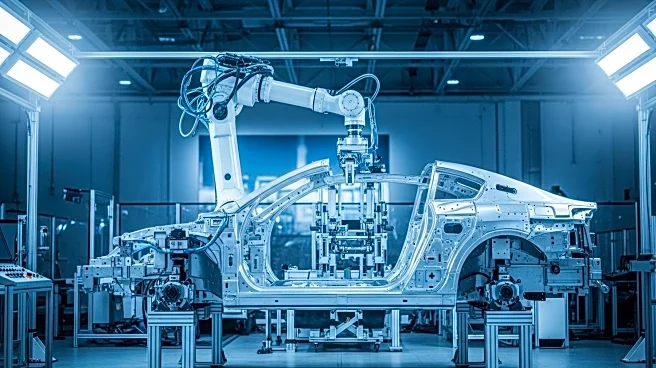What's Happening?
Hyundai has announced a significant investment of $2.7 billion into its electric vehicle (EV) battery factory in Georgia, despite a recent ICE raid that detained hundreds of workers. The investment is part of Hyundai's broader strategy to expand its presence in the U.S. market, including the introduction of new electrified models and a mid-sized pickup truck by 2030. The announcement was made during Hyundai's CEO Investor Day in New York City, marking the first time the event was held outside South Korea. Hyundai CEO Jose Muñoz expressed sympathy for the detained workers and reaffirmed the company's commitment to job creation in the U.S. The Georgia factory, a joint operation with LG Energy Solutions, is central to Hyundai's North American manufacturing efforts, with plans to produce 500,000 vehicles by 2028 and create 3,000 jobs.
Why It's Important?
Hyundai's investment underscores the automaker's commitment to expanding its manufacturing footprint in the U.S., a move likely to bolster local economies and create jobs. The focus on EVs and hybrids aligns with global trends towards sustainable transportation, although the U.S. market may see slower growth due to reduced incentives. The investment also reflects Hyundai's strategic response to geopolitical pressures, including tariffs and trade policies. By increasing local production, Hyundai aims to mitigate risks associated with international supply chains and align with U.S. manufacturing priorities. This development could influence other automakers to enhance their U.S. operations, potentially reshaping the automotive industry landscape.
What's Next?
Hyundai plans to continue its expansion in the U.S., with the Georgia factory playing a pivotal role in its strategy. The company aims to have 80% of its U.S. sales come from locally built vehicles by 2030, increasing supply chain content from 60% to 80%. This move may appease political pressures for domestic manufacturing. Hyundai's introduction of extended-range EVs and hybrids could cater to U.S. consumer preferences, potentially driving sales growth. The company will also focus on integrating robotics and software-defined manufacturing processes, enhancing efficiency and innovation. Stakeholders, including local governments and industry partners, are likely to monitor Hyundai's progress closely.
Beyond the Headlines
The ICE raid at Hyundai's Georgia factory highlights ongoing challenges related to immigration enforcement and labor rights. The incident has prompted investigations into potential human rights abuses, raising ethical concerns about workforce management in the industry. Hyundai's response, including its investment and public sympathy, may influence corporate practices regarding employee treatment and community relations. The integration of robotics and advanced manufacturing techniques at the factory could set new standards for industry operations, potentially impacting labor dynamics and skill requirements. As Hyundai navigates these complexities, its approach may serve as a case study for balancing business objectives with social responsibilities.









